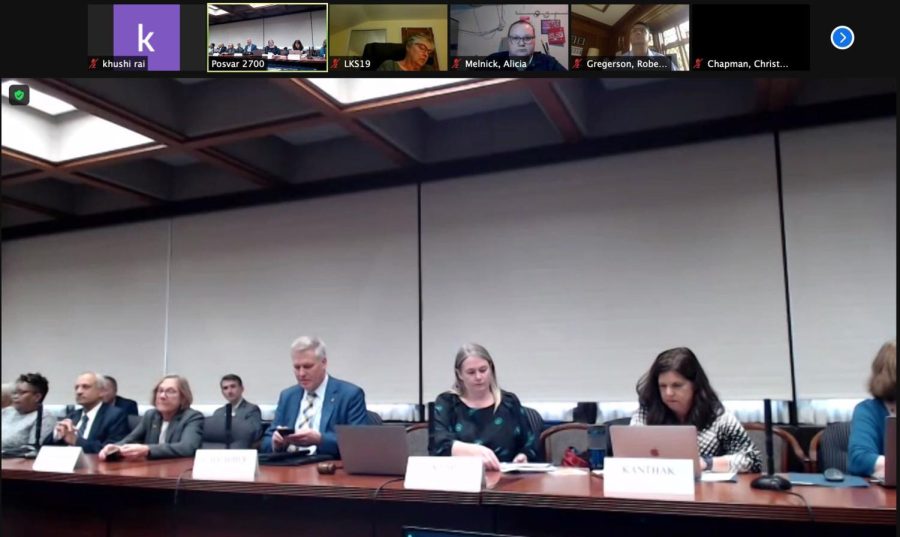Senate Council talks sexual assault cases, increased security presence on campus
Thursday’s Senate Council meeting.
October 13, 2022
Chief of Police James Loftus said Pitt police have yet to identify the perpetrator of the recent sexual assault in the Cathedral of Learning.
“In the case in the Cathedral, we’ve got a lot of information,” Loftus said. “We’ve received a lot of tips about this, but to be fair, we have nothing concrete. We don’t have anybody identified. Information is still coming in and, although it’s hard to believe because it’s been a while, we’re still reviewing all those wonderful cameras that we have in the Cathedral.”
Pitt’s Senate Council held its monthly meeting on Thursday both in person at room 2700 of Posvar Hall and over Zoom. They discussed recent sexual assault cases on campus, including the assault in the Cathedral of Learning and students’ demands for increasing safety on campus. They also discussed the chancellor search committee’s expectations for a new chancellor.
Loftus said there were many concerns raised about the recent crime alerts detailing sexual assaults that occured this semester at Dithridge Street, the Cathedral and a residence hall.
According to Loftus, the residence hall case has moved out of the investigative and prosecution stages, and an administrative investigation within the University will soon begin. He added that the Dithridge Street case prompted Pitt police to work alongside City police.
Loftus said Pitt police increased its security presence in the Cathedral because of the increased anxiety after the sexual assault case.
“Stairwells are being checked,” Loftus said. “We’re moving towards some video surveillance in those stairwells that would be more comprehensive than what we currently have. I have to make that call based on my training and experience to try to put the best cabaret out there to address the situation. We’ve changed the Cathedral posture.”
He said everyone with a Pitt email address is “opted in” to receive crime alerts, which equates to roughly 40,000 people. Loftus said a byproduct of this increased awareness is “concern triggered in some folks.”
Chancellor Patrick Gallagher said surveys have shown that while sexual assault awareness continues to go up, universities have not implemented meaningful differences to some of the underlying contributing factors of sexual assault.
“The one thing I’m concerned about is we don’t want to turn the information into just causing fear, because we could move into the opposite way,” Gallagher said. “I hope we start to look beyond the incident intervention and sort of the investigatory side, and look before the events and also supporting the survivors after the event. This is a highly traumatic event. The whole thing matters. I do acknowledge that I view the silver lining in this that it has prompted an urgency to the discussion.”
Senate Council President Robin Kear said public health experts recognized sexual violence as a public health problem with costs that have “rippled throughout our society.”
“While we hope to eradicate sexual violence, we know that it continues, but we can work every day to make our community secure, safe and responsive as it can be in the way that survivors want,” Kear said. “It’s our job as faculty to discuss the nuances of issues of sexuality, consent and security and its impacts in our classrooms and educational spaces. Faculty with expertise can work with students and administrative partners. We have done this and will continue to do this.”
An undergraduate student raised concerns about dialogue between the student body and the University on behalf of students who attended last Friday’s protest. They said they heard “concerning reports” that the protesters were rudely informed by Pitt police that they must exit the Cathedral or risk facing disciplinary action or arrest.
“I think it could have been handled better, because we did have some student leaders step up and ask the people who were forcing us to disperse and there were no answers given,” the student said. “It was that there was no conversation. There was no listening to the students. It was pure intimidation because a large group of cops walked into a vulnerable population. One of them said that if we didn’t leave, we would be taken out in handcuffs.”
In response to the student’s concern, Gallagher said students’ right to express themselves is a protected right but is a “constrained” one.
“It can depend on where it’s happening, the circumstances, the facility and the building,” Gallagher said. “The hardest time to navigate the circumstances of any particular protest is in the middle of it because passions are high and it’s not always the best circumstances to then be suddenly having a discussion about … who’s next on this schedule? But it’s often something we are happy to have that discussion with students who are planning that. If something happens that seems inappropriate or wrong, we absolutely want to hear about it afterward.”
The council also discussed the methods for choosing a new Chancellor. Eva Blum, chair of the Pitt’s Board of Trustees, said the school is looking for a person who has a great position right now and is “probably not looking for another job.”
“The work of the search committee is to recommend to the Board of Trustees a list of candidates who would qualify and would be great Chancellors,” Blum said. “It is the most important job of the Board of Trustees to pick the leader of the University. We’re hoping to complete our work sometime in the spring.”








